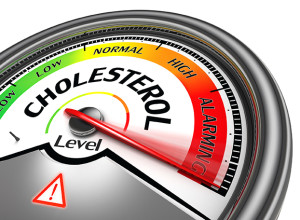
The U.S. Food and Drug Administration has approved a second drug that’s part of a potent new class of medications that sharply cut levels of “bad” LDL cholesterol.
Repatha (evolocumab), an injectable drug, works by blocking a protein that interferes with the liver’s ability to remove LDL cholesterol from the blood.
The FDA approved Praluent (alirocumab), another injectable drug in the same class of medications as Repatha. Both drugs are called PCSK9 inhibitors, which don’t seem to cause the muscle problems that cholesterol-lowering statin drugs sometimes can.
Our Take
Thomas Boyden, MD, a cardiovascular specialist with Spectrum Health Medical Group, considers the introduction of a novel class of drug, the PCSK9 inhibitor, “a major breakthrough in the prevention and treatment of cardiovascular disease.”
Not only is it an entirely new way of addressing risk reduction through the treatment of one of the major factors for coronary artery disease, peripheral arterial disease and cerebrovascular disease, Dr. Boyden said, it will hopefully answer the long-debated question of the impact of lowering LDL cholesterol.
He said that clinical trials of alirocumab and evolucumab, the two FDA-approved PCSK9 inhibitors, show that they are “exquisitely effective” at lowering LDL. However, he added, we still do not have data on clinical outcomes, the most essential component of any medical treatment.
“If this new treatment paradigm proves to be as effective at lowering LDL as it is at reducing cardiovascular risk, the sky is the limit for these drugs,” Dr. Boyden said.
The PCSK9 inhibitor medications also appear to have few side effects and are better tolerated by patients than previous medications.
“The ultimate fate of these drugs will lie in the long-term benefits to patients in the form of clinical outcomes balanced against the substantial cost that is currently associated with their introduction,” Dr. Boyden said.
“While insurers have not yet decided on coverage for these medications, the uptake of these medications will surely rest on availability of these medications through coverage plans.”
“Repatha provides another treatment option in this new class of drugs for patients with familial hypercholesterolemia or with known cardiovascular disease who have not been able to lower their LDL cholesterol enough with statins,” said Dr. John Jenkins, director of the FDA’s Office of New Drugs at the Center for Drug Evaluation and Research.
A recent review of 24 clinical trials—published in the Annals of Internal Medicine—found that PCSK9 inhibitors lowered people’s LDL cholesterol by about 47 percent, on average.
More important, the drugs seemed to cut the risk of heart attack or death from heart disease, according to the researchers.
Experts did urge some caution, however: The trials so far have been short-term, and it’s not clear whether the new drugs really do extend people’s lives, according to Dr. Seth Martin, a cardiologist at Johns Hopkins University in Baltimore.
“Still, the early data are exciting, and we’re cautiously optimistic,” Martin, who co-wrote an editorial published with the review, told HealthDay.
Until large clinical trials are completed in 2017, health experts won’t have definitive proof that the new drugs actually reduce the risk of heart attacks and death.
Statins have long been the go-to treatment for lowering LDL cholesterol. Studies have proven they can help prevent heart attacks, strokes and other cardiovascular complications.
But for some people, statins cause intolerable muscle pain. “Those people would be obvious candidates for PCSK9 inhibitors,” Martin said.
For others, statins just don’t do the job—including people with familial hypercholesterolemia, an inherited condition that causes very high LDL levels and heart attacks at an early age. That’s another group of people that could benefit from the new drugs, Martin said.
“Familial hypercholesterolemia is not rare,” he noted. “It affects about one in 300 to 500 people.”
Of the trials covered in the Annals review, half involved people with familial hypercholesterolemia. Some of the other trials focused on people who’d quit statins because of the side effects.
However, that doesn’t mean the new drugs are completely safe. Martin said the main concern that has arisen in trials of the new drugs is the potential for “neurocognitive effects.” For example, some study patients reported problems such as confusion and trouble paying attention. But, Martin said, it’s not clear yet whether the PCSK9 inhibitors are actually the cause.
For the Annals review, researchers led by Dr. Eliano Navarese, of Heinrich Heine University in Dusseldorf, Germany, pooled the results of 24 clinical trials involving more than 10,000 patients. Some compared a PCSK9 inhibitor to a placebo (an inactive treatment), while others used the cholesterol drug ezetimibe (Zetia) for comparison.
Overall, the researchers found, the new drugs cut LDL to a greater degree. They also lowered patients’ risk of heart attack or death by about half.
Dr. Suzanne Steinbaum, a preventive cardiologist at Lenox Hill Hospital in New York City, told HealthDay that the results of the new cholesterol drugs were so far encouraging.
“For all those patients unable to take statins, finally there might be an option that can change [their] outcomes,” said Steinbaum, who was not involved in the recent review.
But, she added, “we need to patiently wait for the next phase of trials to see whether the clinical outcomes are as promising as the initial studies suggest.”
The new drugs have to be self-injected, which might put some people off. On the other hand, Martin said, the injections are done only once a month or every couple of weeks.
“Some people may prefer that to taking a pill every day,” he said.
Then there’s the cost. PCSK9 inhibitors are specialty drugs known as monoclonal antibodies, which are lab-altered versions of human antibodies. And they aren’t cheap.
The new drugs could cost up to $12,000 a year per patient, according to a recent estimate by CVS Health, one of nation’s largest pharmacy benefit managers.
Repatha is marketed by Amgen Inc., of Thousand Oaks, Calif.
 /a>
/a>
 /a>
/a>
 /a>
/a>